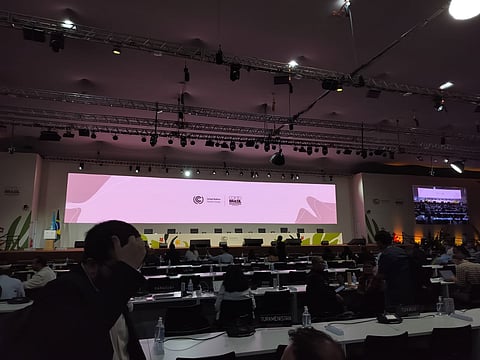

At the closing plenary on November 22 afternoon, the 30th Conference of the Parties (COP30) to the UN Framework Convention on Climate Change (UNFCCC) formally adopted a new Just Transition Mechanism (JTM) — also known as the Belém Action Mechanism (BAM) — but left its operational timeline, technical functions, and finance undefined. The mechanism is intended to strengthen cooperation, technical assistance and capacity-building, yet falls short of delivering the predictable, additional finance demanded by developing countries.
While the Just Transition Work Programme (JTWP) decision advanced, it stopped short of establishing the full mechanism. Instead, countries are tasked with drafting recommendations at the 64th Subsidiary Bodies meeting in Bonn next year, with the aim — though not a firm commitment — of operationalising it at COP31. The outcome omits central demands from developing countries:
No reference to unilateral trade measures (UTMs)
No obligation for developed countries to provide means of implementation
Discussions were facilitated by Federico Africano (Italy) and Joseph T (Singapore), with ministerial consultations by Mexico and Poland. Multiple Parties placed interpretive statements on record:
Gender equality: References in OP12(h) and OP12(p) were noted.
Sovereignty and self-determination: Interpretation of OP12(i) must align with UN Charter principles and human-rights treaties.
Universal energy access: OP12(n)–(o) must reflect permanent sovereignty over natural resources (UNGA 1803).
Indigenous Peoples’ rights: Canada warned against conflating Indigenous Peoples with local communities, cautioning that COP30 must not “walk back” hard-won recognition of Indigenous rights.
With no reference to a global roadmap for phasing out coal, oil and gas, COP30 — billed as the first “implementation COP” and marking 10 years of the Paris Agreement — missed a critical moment to anchor the energy transition in the UN climate process. Civil society organisations said the final text’s call to “accelerate implementation of the UAE Consensus” is far too weak to drive transformational mitigation action. The absence of a clear process to strengthen NDCs, coupled with no signal that major emitters will lead on fossil fuel phaseout, leaves COP30 misaligned with science and the Paris Agreement’s equity principles.
A just transition acts like a societal safety net during a major economic shift. As fossil fuels are phased out, workers and communities must receive support—skills training, investment, and economic planning—to avoid being left behind.
A dedicated just transition mechanism is especially critical for developing countries. They face the steepest social and economic disruption from fossil-fuel phase-out, despite contributing least to the climate crisis. These countries must expand energy access, retrain workers, diversify economies, and protect vulnerable communities—all while confronting worsening climate impacts. According to the latest Independent High-Level Expert Group on Climate Finance (IHLEG), developing countries (excluding China) need $2.4 trillion per year by 2030 to meet climate goals. Within this, the International Labour Organization and the World Bank estimate that $100–400 billion annually is required specifically for just transition measures such as social protection, worker support, retraining, and clean-energy expansion. Without this scale of predictable, concessional public finance, a just transition will remain out of reach for many nations.
“Delivering BAM was a major civil society win… but beyond this success, COP30 leaves us with a grim picture,” said Chiara Martinelli, Director at CAN Europe. “Adaptation was sidelined, and fossil fuels were erased. Ten years after Paris, we expected courage. Instead, world leaders delivered the bare minimum.”
Researchers on climate change and just transition at India’s Centre for Science and Environment (CSE) agreed that the JTM is a significant win for developing countries but warned that unclear timelines, undefined functions and lack of finance risk turning it into an “empty mechanism.”
CAN International echoed this view, praising the mechanism’s unprecedented language on human rights, labour rights, gender equality, and the rights of Indigenous Peoples and Afro-descendants. But it warned that COP30 delivered “dangerously weak” outcomes on adaptation finance and failed to produce a concrete, funded plan to close the ambition gap. Developed countries’ refusal to commit finance for adaptation, mitigation and fossil-fuel transition “directly weakened the overall outcome” and further eroded trust.
The centrality of just transition resurfaced sharply when Colombia objected to the Mitigation Ambition and Implementation Work Programme text, arguing that it excluded essential language on pathways for transitioning away from fossil fuels (TAFF).
“There is no mitigation if we cannot discuss transitioning away from fossil fuels with means of implementation in a just, orderly and equitable manner,” Colombia said at the closing plenary, noting that fossil fuels account for nearly 75 per cent of global CO2 emissions. Excluding such discussion puts both the climate regime and the 1.5°C goal “at risk.”
Madhura Joshi, Programme Lead for Global Clean Power Diplomacy at E3G, said COP30 “delivered the truth” about the difficulty of real transitions.
“Equity remains the foundation of a just transition for the billions already facing severe climate impacts. Protecting people and the planet now demands scaled-up finance, stronger resilience, and accelerated shifts away from fossil fuels," she said.
Looking ahead, the COP30 President announced plans to develop two science-led, inclusive roadmaps: one of two is on TAFF in a just, orderly and equitable manner. These processes will convene governments (both producers and consumers), international organisations, industry, labour, academia, and civil society. The effort will draw on the first international conference on the phase-out of fossil fuels, to be held in April in Colombia.
These will convene governments, international organisations, industry, labour, academia and civil society. They will also draw on the First International Conference for the Phase-Out of Fossil Fuels, to be held in April in Colombia.
Kumi Naidoo, president of the Fossil Fuel Treaty Initiative, welcomed this, stating: “The UNFCCC rules of procedure are clearly broken. We cannot wait another year for another weak political signal. That’s why Colombia and the Netherlands launched a parallel conference to push for a Fossil Fuel Treaty — the highest-ambition roadmap available.”